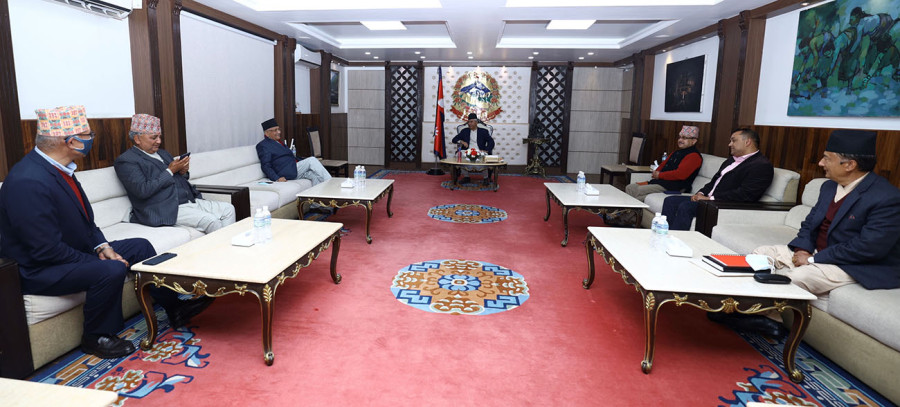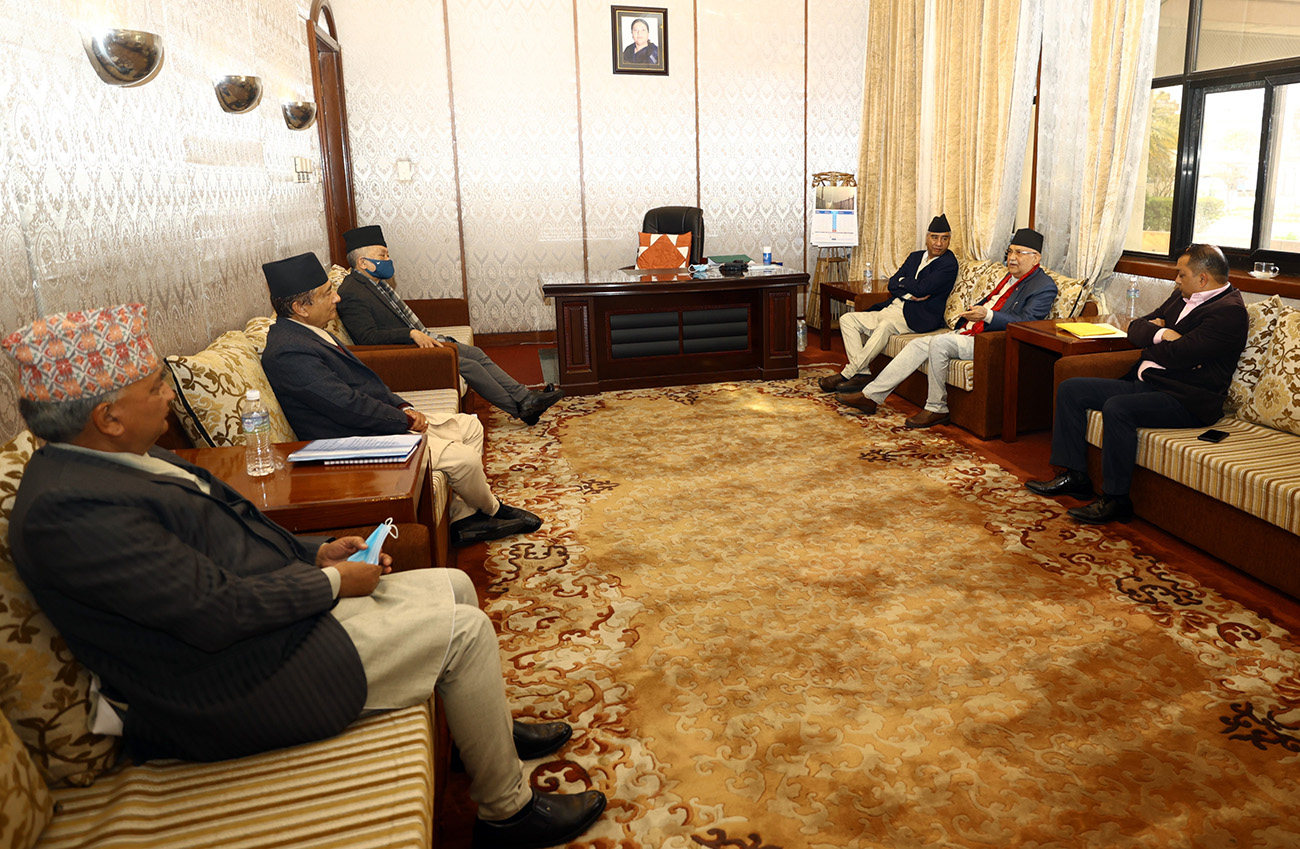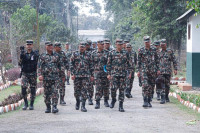National
A new equation is in the making as Congress, UML take negotiations forward
With his government partners standing against the MCC’s ratification, Prime Minister Deuba has expedited talks with opposition leader Oli, who has a litany of preconditions.
Anil Giri & Binod Ghimire
The Nepali Congress and the CPN-UML late on Thursday night failed to reach a deal on a wide range of issues, including ratification of the American grant and removal of the Speaker, but the current alliance appears to be on the verge of breakdown, with leaders saying a new political equation is a matter of days away.
After two coalition partners—the Communist Party of Nepal (Maoist Centre) and the CPN (Unified Socialist)—stuck to their guns to vote against the Millennium Challenge Corporation-Nepal Compact, Prime Minister Sher Bahadur Deuba held talks with KP Sharma Oli, chair of the main opposition CPN-UML, twice on Thursday, in the afternoon and late in the evening.
As the UML remained adamant on removing Speaker Agni Prasad Sapkota during both meetings on Thursday, some legal opinions are now being sought, leaders familiar with the negotiations said.
“No deal could be reached today, but we are heading in the right direction,” said Subas Nembang, UML’s Vice Chairman. “We will sit again on Friday morning to hash the issues out.”
Besides removing the Speaker so as to ensure ratification of the MCC compact, other power-sharing issues also were discussed between Prime Minister Sher Bahadur Deuba and UML chair Oli.
For Deuba, ratification of the MCC compact has emerged as the most pressing issue. And with his coalition partners opposed to it, the UML is the best bet for him.
At Thursday night’s meeting, Congress leaders suggested that since numbers were not adequate to remove the Speaker immediately, the two parties should first join hands to ratify the MCC compact, according to Congress General Secretary Gagan Thapa.
But the UML maintained that the Speaker should be ousted first.
“Both sides discussed and agreed to reach a political understanding like in 2015 during the promulgation of the constitution,” Nembang told the Post. “We have discussed several issues in the last couple of days so we need to fine tune them. The key issue between the two parties is how and when to remove Speaker Agni Sapkota.”
A Speaker can be removed by a two-thirds majority of the House, and it will need 181 votes, which the Congress (61) and UML (97) lack.
Earlier on Thursday, Home Minister Bal Krishna Khand met with Speaker Sapkota and asked him to follow the parliamentary rules and regulations and not create obstructions to the government’s proposals in the House.
With its partners standing dead against the MCC compact, the Congress’ options have shrunk.
And the best way forward for the Congress is to break the alliance and join hands with the UML, according to leaders from the two parties, say Congress leaders.
“We have to enter into a detailed power-sharing deal with the UML,” said a Congress office bearer. “Besides taking action against Speaker Sapkota, there are issues like changing some provincial governments and some provincial chiefs. The UML is also seeking assurances on timely elections.”
The UML is also learnt to have been pushing for early parliamentary elections—sometime in April-May—as it also vindicates Oli who had dissolved the House twice in the past saying there was a need for a fresh mandate from the people.
Just as Nepali parties are sharply divided over the MCC compact, it has thrown Nepal into a geopolitical quagmire with Beijing increasingly asserting its position and reproaching the United States for its “coercive diplomacy”.
China’s Foreign Ministry spokesperson Hua Chunying even questioned whether MCC is a gift or Pandora’s box, in one of the strongest messages to the United States in reference to Nepal and the American grant.
Prime Minister Deuba is clearly under pressure amid several communications over the past few days from Washington for MCC compact’s ratification by February 28, a deadline set by him and Maoist chair Dahal.
A UML leader said unless there is a miracle to save the current coalition, a new political equation between the Congress and the UML is very much in sight.
Thapa, the Congress leader, said the MCC compact is a national issue so it has to be ratified.

“Therefore breaking the alliance is not a big issue if we agree to take the MCC compact forward,” said Thapa. “And, the MCC was tabled in the House when Oli [Oli] was leading the government.”
Signed in September 2017, the compact is about Nepal receiving $500 million in grants from the US for building electricity transmission lines and improving roads.
The compact was registered in Parliament in July 2019 when Oli was prime minister.
Earlier on Thursday morning, Maoist Centre chair Dahal had met Prime Minister Deuba and made it clear that his party will vote against the compact and that his party is ready to leave the government and will struggle from the streets against the compact.
“I am under pressure to ratify MCC and I want to get it ratified by the alliance. If other ruling parties don’t extend their support, I have no other option left than to break the alliance. If you can support, you do, otherwise I have to look for other alternatives,” Deuba told Dahal, according to another Congress leader.
Before meeting Deuba, Dahal had held talks with Unified Socialist chair Madhav Kumar Nepal and the party’s senior leader Jhalanath Khanal.
Thursday’s Business Advisory Committee had set the agenda for the day’s House meeting, including deliberations on the MCC compact. But the House meeting was called off at the request of Prime Minister Deuba.
After Deuba and Oli’s meeting, Dahal met with Oli.
According to a UML Central Committee member, Dahal offered Oli the post of prime minister.
“The UML does not have confidence in Dahal,” the member said. “I am quite convinced that the Congress and the UML will be able to reach a new deal.”
Dahal had also urged UML leaders and Oli to stand together on the MCC compact, according to Dev Gurung, a Maoist leader.
The next meeting has been called for 1pm Friday.
“The meeting was deferred at the last moment following a request from the prime minister,” Gopal Nath Yogi, secretary at the House of Representatives, told the Post.
According to Congress leaders, Deuba requested postponement of the meeting so as to hold discussions with the UML as the Maoist Centre reiterated that it would vote against the MCC compact.
“The Speaker’s actions are also targeted more at failing it rather than facilitating its endorsement,” Min Bishwakarma, a Congress lawmaker close to Deuba, told the Post. “The government wants to move the compact forward for its ratification.”
There is also confusion as to how the voting will take place if the MCC compact is put to a vote. While the general practice is conducting a voice vote, where the Speaker decides based on the voice in favor or against, some lawmakers have been demanding a “proper voting” with signatures.
Congress leaders say Sapkota has been insisting that he will not allow ‘voice vote’ while also counting the UML lawmakers as “present” even if they do not participate in the ratification process by continuing their obstructions.
“Counting the UML means the Speaker is clearly against ratification,” a Congress leader told the Post on the condition of anonymity. “Since the UML has 97 votes, if its lawmakers are counted as present, it will significantly increase the number of votes needed to ratify the compact.”
It takes a simple majority—51 percent of the lawmakers who are “present” at the time of voting must vote in favour to ratify the compact.
Minister for Communication and Information Technology Gyanendra Bahadur Karki said that the UML reiterated its position that the Speaker needs to be removed first.
“The UML wants removal of the Speaker or expulsion of the 14 lawmakers as it had decided in August,” Karki told the media after the late night meeting between the Congress and the UML. “No deal has been reached yet. Nonetheless, we have decided to continue talks. We will sit again on Friday.”




 8.85°C Kathmandu
8.85°C Kathmandu















